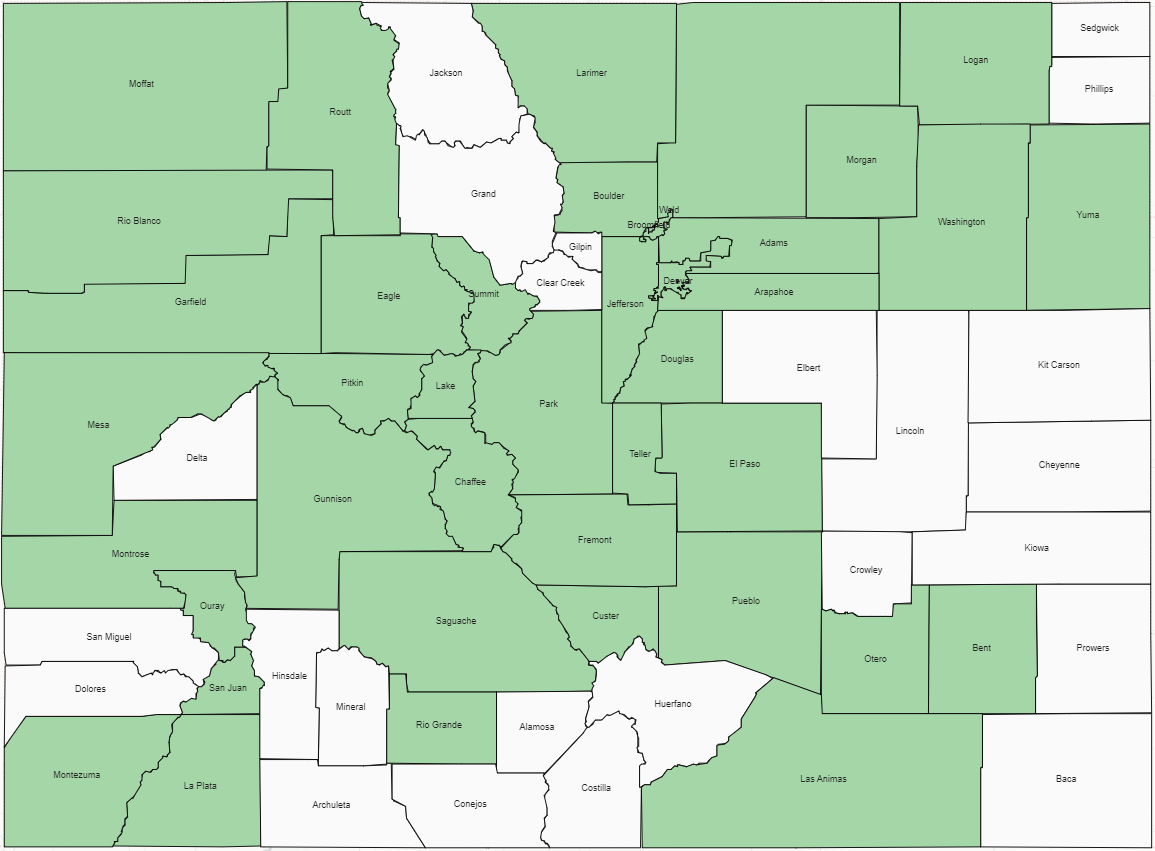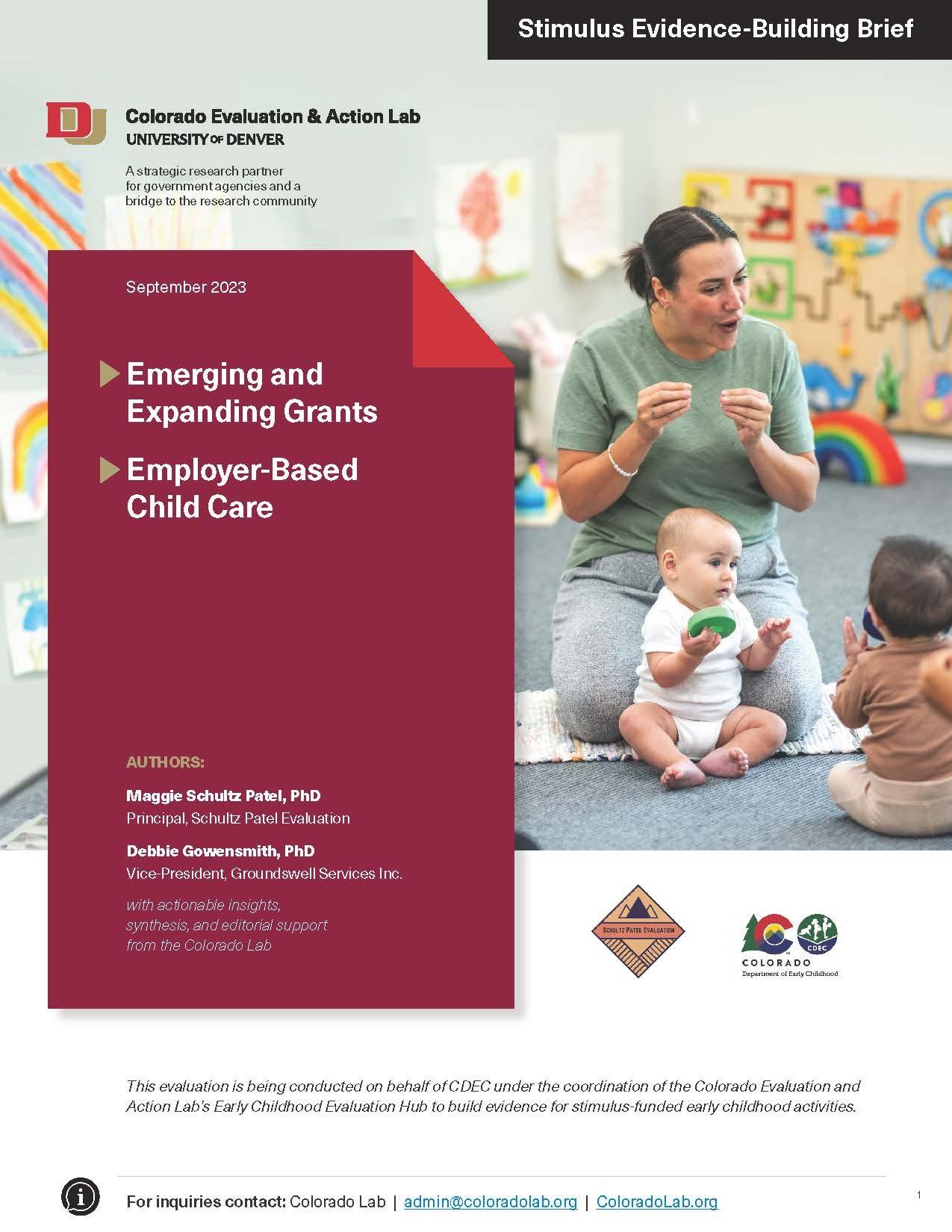Emerging and Expanding Grants
The Need
Prior to the pandemic, more than half of Coloradans lived in licensed child care deserts, where there are three or more children under five years old for every available child care slot. Child care providers, already struggling to make ends meet, were faced with even greater challenges in the face of the COVID-19 Public Health Emergency. In the first few months of pandemic conditions, about 60% of families reported needing to change their child care arrangements and 10% of providers reported needing to close their doors, worsening the availability of affordable quality care for families statewide.
The Strategy
The Emerging and Expanding (E & E) Grant program is designed to expand access and availability of licensed child care throughout Colorado. Priority is given to programs in underserved communities, in licensed child care deserts, and those with infant and toddler capacity.
The E & E program provided funding to support licensed child care in sustaining and expanding their businesses. Eligible providers could receive grants ranging from $3,000 to $50,000 to cover expenses related to the expansion of current capacity or the opening of a new child care program. For example, funding could be used for coaching, professional development, learning and classroom materials and capital improvements.
The program has completed funding for one cohort of providers and is in the process of awarding grants to a second cohort. The most current application opened on July 31, 2023, and closed on August 25, 2023. $11 million was made available in January 2023 for a second cohort, and the legislature approved an additional $3 million to be available in July 2023.
Key Outcomes and Learnings
Impact
From July 1, 2021, to June 30, 2022, the E & E program was successful in expanding capacity by 5,459 new child care slots across 37 counties. Notably, 1,643 of the newly created slots were specifically designated for infants and toddlers.
- In the first cohort, the program received 446 applicants from 47 counties.
- Of these, 262 applications were eligible for funding. A total of $10.1 million was awarded.
- Awarded programs included 148 child care centers and 115 family child care home providers.
- 58% of counties had an eligible provider receive funding, reaching every region of the state, from urban to frontier. Additionally, 88% of funds went to counties identified as having low or very low licensed child care capacity.
Read the final report from the first round of funding.
Learning
Everyone involved with the E & E program had a learning curve. The lessons learned include:
- The majority of applications requested support for capital improvement projects, demonstrating a great need for funding in this area.
- Large capital projects take time to do correctly due to planning, access to materials and availability of services.
- Technical Assistance, particularly as it relates to capital projects, is needed. The various contractor licensing, bonding, insurance and zoning issues are complicated to learn, especially for child care providers unfamiliar with these processes. CDEC procured Thrive Community Building as the technical assistance vendor to assist with this through September 30, 2024. The effectiveness of this solution is being evaluated.
- Programs are experiencing additional, future need for building maintenance funding. Many of the programs requesting grant funding struggle with regular building maintenance because providing child care requires them to operate on very narrow margins. Ongoing building maintenance support will help providers keep up with health and safety requirements and make investments through Colorado Shines Quality Improvement Incentives more sustainable.
- While licensed capacity increased, many providers faced challenges in hiring qualified teachers and directors to fully realize the capacity increase. This challenge is due mainly to low levels of compensation offered to early childhood professionals.

Funding
Amount:
- Fiscal Year 2022: $10,100,000
- Fiscal Years 2023-2026: $19,000,000
Sources:
- American Rescue Plan
- State and Local Federal Recovery Funds (SLFRF)
- State General Fund
Expiration:
- December 30, 2026
- Funds for Fiscal Years 2023-2026 must be fully encumbered by December 31, 2024
Next Steps
For the second cohort of funding, there will be two rounds of applications. The most current application opened on July 31, 2023 and closed on August 25, 2023. CDEC E&E team is reviewing applications where an eligibility determination has not been made. CDEC received more than doubled the total E&E program budget in application requests. In light of this, E&E applications will be reviewed and prioritized utilizing the following criteria:
- Emerging/Expanding Infant and Toddler slots
- No previous E & E funding
- Child care needs/desert score
- In progress, close to completion (E & E is the last funding in to any project)
Applications that meet one or more of the following criteria will be put on hold:
- Adding only preschool slots
- Previously receiving E & E funding
- Capital project has not started/is not far enough along for the licensing specialist to measure for slot determination
- In the adverse licensing process
- Other factors that indicate the project may not be sustainable and/or that E & E is not an appropriate program for the applicant to participate in
In the event there is funding available after eligibility determinations have been made on prioritized applications, we will revisit the applications “on hold”.
CDEC will also continually be evaluating changes made during the FY 2023 - 26 funding round including but not limited to the effectiveness of procuring a technical assistance vendor. Read the Frequently Asked Questions about this program.
Evidence Brief
"Emerging and Expanding Grants and Employer-Based Child Care"
Schultz Patel Evaluation
(September 2023)


